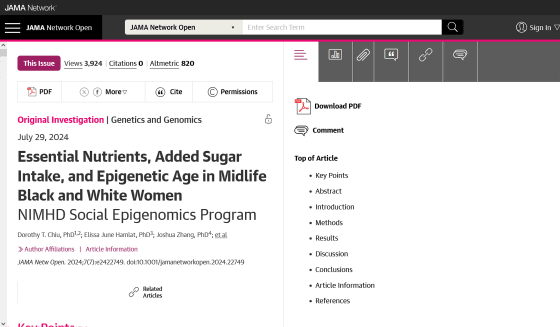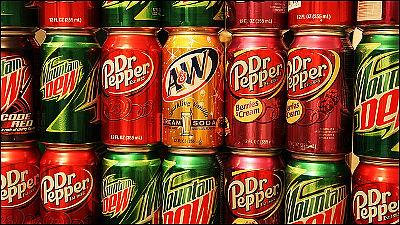People who consume a lot of sugary snacks and drinks may experience accelerated biological aging

It is widely known that a healthy diet is important for living longer, but many people find it difficult to give up sugary snacks and carbonated drinks. A new study by a research team from the University of California, San Luis, has found that people who consume a lot of sugar, even if they have a healthy diet, age faster biologically.
Essential Nutrients, Added Sugar Intake, and Epigenetic Age in Midlife Black and White Women: NIMHD Social Epigenomics Program | Genetics and Genomics | JAMA Network Open | JAMA Network

Healthy Diet with Less Sugar Is Linked to Younger Biological Age | UC San Francisco
https://www.ucsf.edu/news/2024/07/428121/healthy-diet-less-sugar-linked-younger-biological-age
Added Sugar in Your Diet May Speed Up Your Body's Biological Aging : ScienceAlert
https://www.sciencealert.com/added-sugar-in-your-diet-may-speed-up-your-bodys-biological-aging
Even if humans have the same amount of time since birth, the degree of biological aging can differ depending on factors such as lifestyle and environment. One measure of biological aging is the ' epigenetic clock ,' which uses a chemical reaction in DNA called DNA methylation .
To investigate how factors such as essential nutrients and sugar intake relate to biological aging, the team surveyed 342 middle-aged white and black women who completed food records over three nonconsecutive days and used the epigenetic clock to measure biological age from DNA in saliva samples.
In assessing diet, the team compared the women's diets to those rich in anti-inflammatory and antioxidant foods, a Mediterranean diet , and a diet to lower the risk of chronic disease. They also assessed intakes of nutrients involved in anti-inflammatory and antioxidant processes, and DNA maintenance and repair: vitamin A, vitamin C, vitamin B12, vitamin E, folate, selenium, magnesium, dietary fiber, and isoflavones.

The analysis found that all healthy, nutrient-rich diets were significantly associated with younger biological age, with the Mediterranean diet being the most strongly associated with younger biological age.
On the other hand, the participants were found to have consumed an average of 61.5g of sugar per day, although some consumed only 2.7g per day, while others consumed more than 300g of sugar per day. The United States Food and Drug Administration (FDA) recommends that adults consume no more than 50g of sugar per day.
And they found that the higher the sugar intake, the more advanced the biological aging of participants, even if their diet was otherwise healthy -- even after taking into account factors such as education level, lifestyle and current health status.

'Because epigenetic patterns appear to be reversible, a sustained reduction in sugar intake of 10 grams per day may be equivalent to winding back the epigenetic clock by 2.4 months,' said co-author Barbara Laraia , professor at the University of California, Berkeley. 'Focusing on foods that are high in important nutrients and low in added sugar may be a new way to motivate people to eat well for longevity.'
Related Posts:







